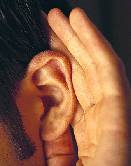 |
 |
 |

Prosthetic Ears Boost Hearing After Injury
Not only restores aesthetics, but also improves speech recognition|
|
HealthDay
By Robert Preidt
Monday, September 15, 2008
 MONDAY, Sept. 15 (HealthDay News) -- Prosthetic ears can help improve hearing and speech recognition for people who've lost an outer ear due to injury or cancer surgery, a new U.S. study reports.
MONDAY, Sept. 15 (HealthDay News) -- Prosthetic ears can help improve hearing and speech recognition for people who've lost an outer ear due to injury or cancer surgery, a new U.S. study reports.
In many cases where the outer ear (pinna) has been lost, the external auditory canal is usually intact, and the remainder of the person's hearing system should function normally. "In these patients, the physician must strive not only to correct the aesthetic defect caused by the missing pinna, but also to correct the hearing loss caused by its absence," wrote Dr. William E. Walsh, of Northwestern's Feinberg School of Medicine, and colleagues.
The researchers analyzed eight different silicone rubber prosthetic ears. In the first part of the study, they attached a microphone at the entrance to a simulated ear canal on a life-sized plastic foam head. The microphone measured sound pressure levels both with and without the ear prostheses attached to the head as it was rotated 360 degrees.
On average, the prostheses improved sound pickup by 8.1 decibels (normal conversation is about 60 decibels) when the frequency of sound was 4.6 kilohertz, and by 9.7 decibels when the frequency was 11.5 kilohertz.
The second part of the study included 11 young adults with normal hearing who took part in a speech test involving simulation of hearing problems associated with the loss of an outer ear. In this test, the prosthetic ears improved speech recognition.
The findings were published in the September/October issue of the journal Archives of Facial Plastic Surgery.
"Auricular prostheses provide an acoustic gain at certain head positions and frequencies, and this acoustic gain is clinically relevant, because it benefits speech recognition in noise," the study authors wrote.
"In some individuals, auricular prostheses not only effectively restore aesthetics, but also may improve hearing. To verify the results of the present experiments, the main outcome measures described in this study will be used to obtain future measurements from individuals who wear auricular prostheses."
HealthDay
Copyright (c) 2008 ScoutNews, LLC. All rights reserved.
Related News:
More News on this Date
Related MedlinePlus Pages:
| Home | Health Topics | Drugs & Supplements | Encyclopedia | Dictionary | News | Directories | Other Resources | |
| Disclaimers | Copyright | Privacy | Accessibility | Quality Guidelines U.S. National Library of Medicine, 8600 Rockville Pike, Bethesda, MD 20894 National Institutes of Health | Department of Health & Human Services |
Date last updated: 16 September 2008 |




